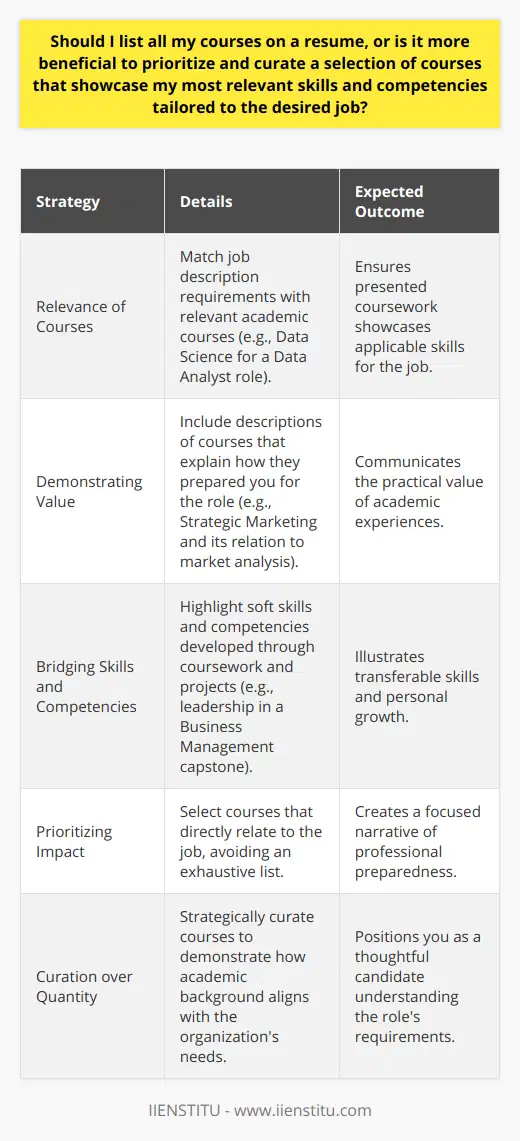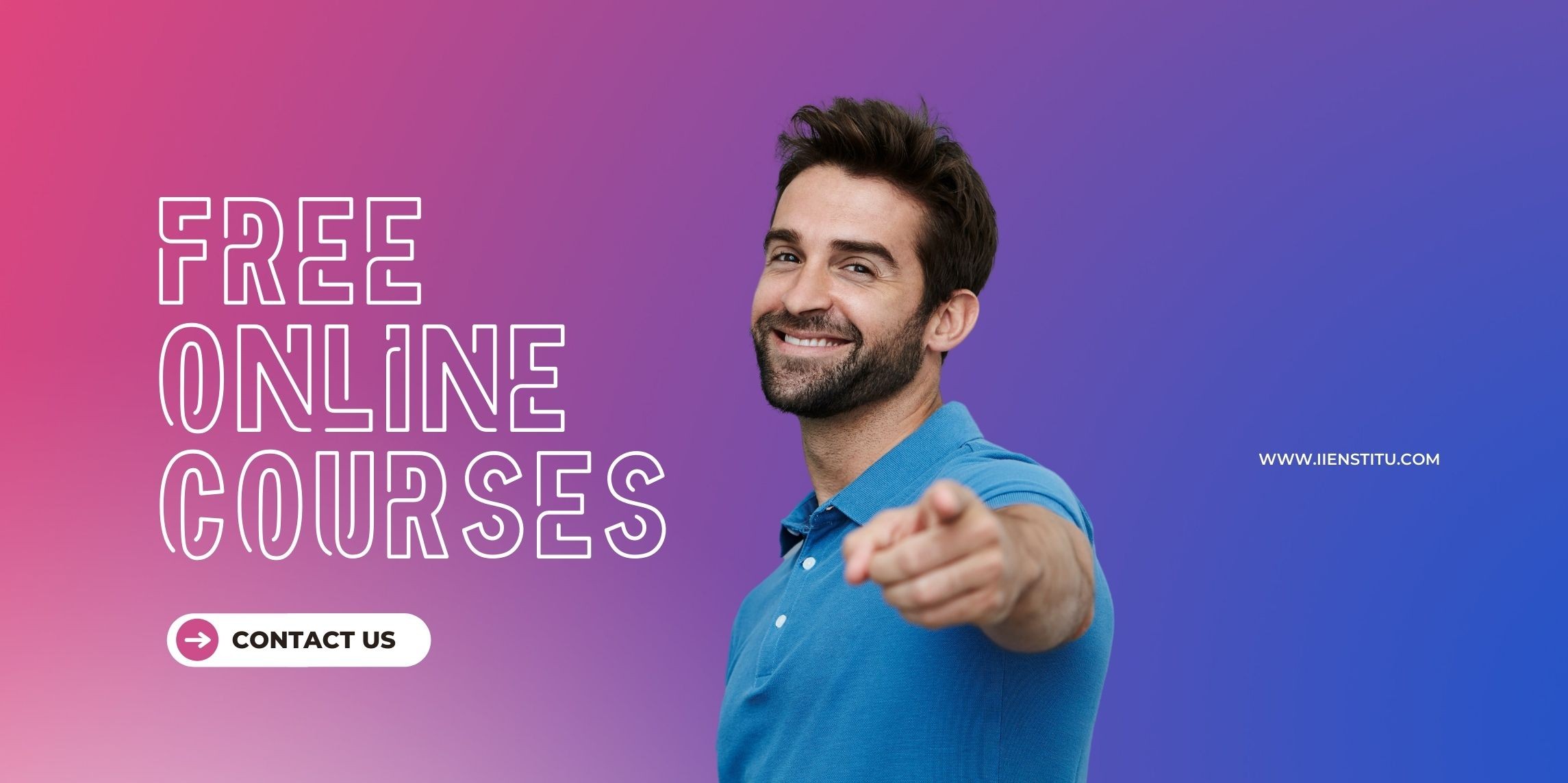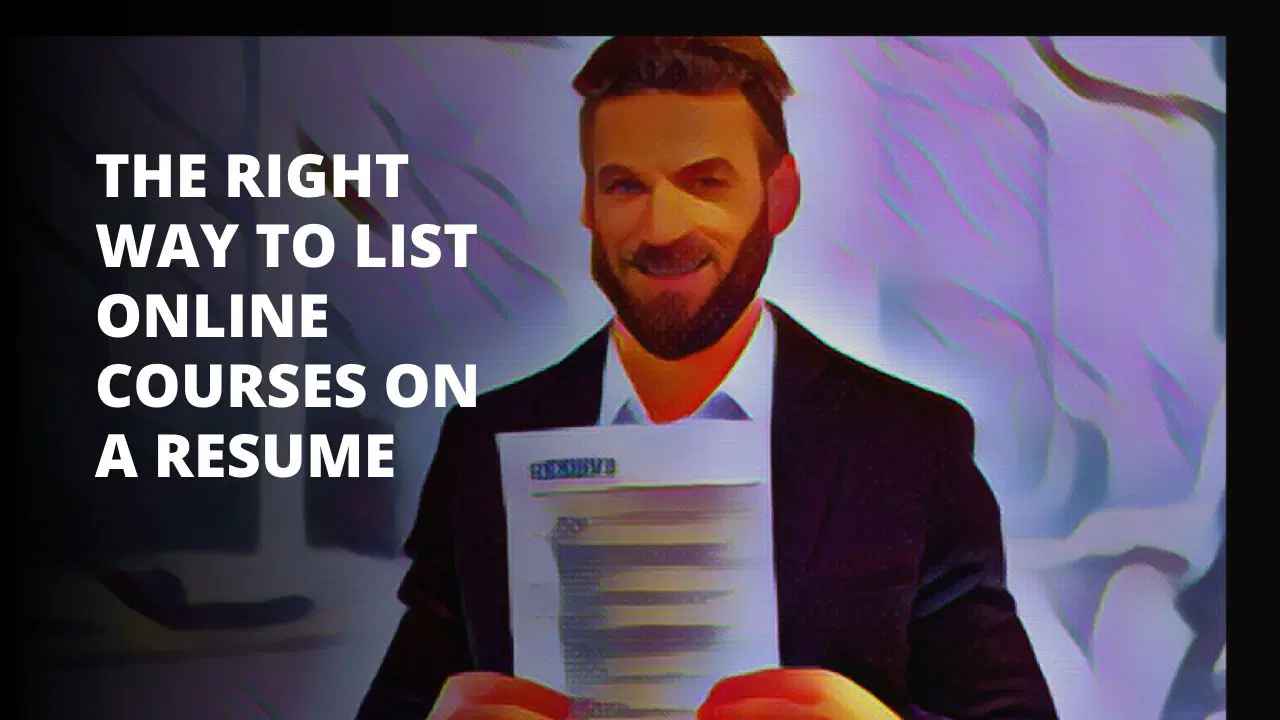
Your resume is a reflection of your professional accomplishments and skills. If you're looking for a job, it's important to include all of the relevant information on your resume, including any online courses you've completed. But how do you list online courses on a resume? And which ones should you include? In this blog post, we'll discuss the best way to list online courses on your resume so that you can showcase your education and professional development. Plus, we'll give you some tips on which courses to include. Let's get started!
How to list online courses on a resume
Many job seekers are wondering how to list online courses on a resume in a way that will benefit their career instead of hurting it. The first step is understanding how much weight recruiters and hiring managers give to online courses when reviewing resumes. While some employers may not care at all, others might see it as a valuable asset, especially if the course is relevant to the position you're applying for. If you're not sure where the company falls, err on the side of caution and don't list the courses unless they're directly related to the job or required by the employer.
If you do list them, put them under a separate heading such as "Online Courses" or "Professional Development" so they don't get lost amongst your other experience and education. Finally, make sure to include the name of the course, the institution it was completed at, and any relevant details such as grades or awards received. By taking these steps, you can ensure that your online courses help you get your dream job instead of holding you back.
List the name of the course, the institution or organization that offered it, and the year it was completed.
How you list online courses on your resume depends on their relevance to the job you're applying for. If the courses are directly related, you can list them under a separate heading, such as "Relevant Courses." If they're not directly related but still relevant, you can list them under a heading like Continuing Education.
Finally, if the courses aren't relevant, you don't need to list them on your resume. When listing online courses, be sure to include the name of the course, the institution or organization that offered it, and the year it was completed. You should also briefly describe the course content and mention any relevant skills or knowledge you acquired. By taking care to list your online courses correctly, you can make sure that your resume highlights the education and training that are most relevant to the position you're interested in.
If you have a certification or diploma in hand as a result of completing the course, list that too.
In addition to the name of the course and the institution it was completed at, you should also include any relevant certifications or diplomas you received as a result of completing the course. For example, if you completed an online course in project management and received a certificate of completion, be sure to list that on your resume.
This will show employers that you not only took the initiative to complete the course but that you also acquired valuable skills and knowledge that can be applied to the job. By including this information on your resume, you can demonstrate that you're a well-qualified candidate with the right skills for the job.
Use action verbs to describe what you learned in the course - for example, "developed," "implemented," or "managed."
When describing the courses you've taken, be sure to use action verbs that will catch the attention of employers. For example, instead of simply listing the course name and institution, you could say something like, "Completed course in project management at XYZ University. Developed skills in planning and executing projects." This tells the employer what you learned in the course and how it can be applied to the job. By using action verbs, you can make your resume more engaging and demonstrate that you have the skills and knowledge required for the position.
If you're targeting a specific job opening, mention how your newly-acquired skills are relevant to that position.
When applying for a job, it's important to tailor your resume to the specific position you're interested in. This means highlighting the skills and experience that are most relevant to the job. If you've taken an online course that has equipped you with skills that are relevant to the job you're applying for, be sure to mention this in your resume.
For example, if you're applying for a position as a web developer, you could mention that you completed a course in HTML and CSS. This will show the employer that you have the skills and knowledge necessary for the position. By tailoring your resume to the specific job you're applying for, you can increase your chances of getting hired.
Keep your resume concise and easy to read - no more than two pages long.
When writing your resume, it's important to keep it concise and easy to read. This means including only the information that is most relevant to the job you're applying for. If you have a lot of information to include, such as multiple online courses, you may need to make use of bullet points.
Bullet points are a great way to highlight key information while keeping your resume readable. When listing online courses on your resume, be sure to include only the most relevant information and limit yourself to two pages or less. By doing this, you can ensure that your resume is clear and concise and that employers will be able to easily find the information they're looking for.
With these tips, you can be sure that your resume will stand out from the rest. By including relevant and up-to-date information about your online courses, you can demonstrate that you have the skills and knowledge needed for the job. With a well-written resume, you can increase your chances of getting hired for the position you're interested in.
Examples
Listing online classes in the education section
Education
Digital Marketing course — Istanbul Business Institute | Tallinn, Estonia (2022)
Related Course: Online Digital Marketing Course
I attended Istanbul Business Institute's online course to improve my digital marketing skills. In this course, I learned how to create and implement digital marketing campaigns, measure their effectiveness, and optimize them for success. I also gained a better understanding of the different channels that can be used to reach target audiences and how to integrate digital marketing into a holistic marketing strategy.
Through this course, I gained the skills and knowledge necessary to effectively use digital marketing to achieve business goals. The experience has been invaluable, and I am confident that it will help me in my career going forward.
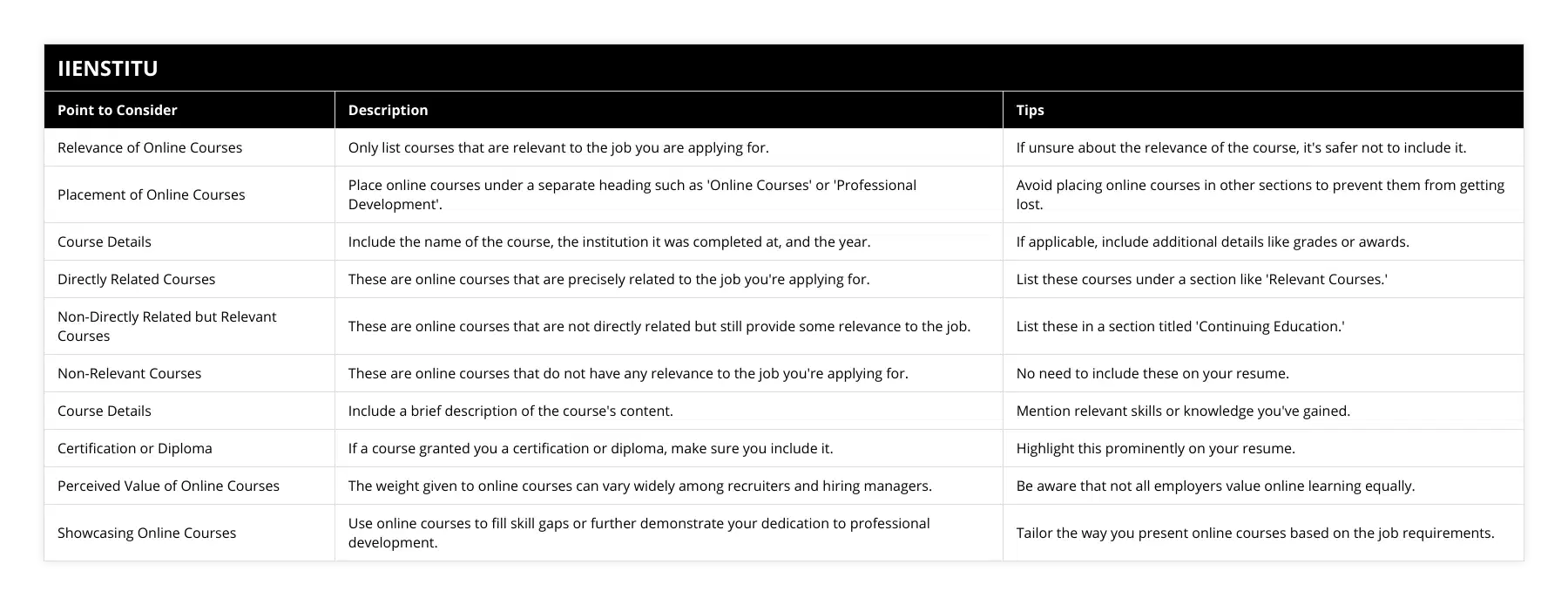
Frequently Asked Questions
How do you incorporate Coursera courses into your resume to showcase your skills and qualifications?
Presenting Coursera Courses on Your Resume
Highlight Relevant Coursework
To effectively showcase your skills and qualifications gained through Coursera courses, it is essential to highlight relevant coursework on your resume. Begin by creating a separate section entitled 'Relevant Coursework' or 'Professional Development' under the education section of your resume. Under this subsection, list the courses you've completed that pertain to the specific job you're applying for, including the title of the course, the platform (Coursera), and the date of completion.
Emphasize Practical Skills
Next, emphasize the practical skills you've acquired from the courses by incorporating them into your 'Skills' or 'Key Competencies' section. When listing these skills, focus on those that are directly applicable to the position you're seeking. Additionally, provide tangible evidence of your abilities by mentioning projects or assignments you've completed during the courses. This approach will allow potential employers to see the real-world application of your knowledge and expertise.
Integrate Certificates and Achievements
Incorporating certifications and achievements from Coursera courses can further bolster your resume. If you've earned any specializations, professional certificates, or course certificates, highlight these accomplishments in your education or certifications section. Be sure to include the certificate title, issuing authority (Coursera), and the date obtained. This information demonstrates your commitment to continued learning and professional growth.
Quantify the Impact
To make your Coursera courses stand out on your resume, you should quantify the impact of your learning wherever possible. Use specific figures, percentages, or timeframes to clearly demonstrate the positive results you've achieved through the application of your skills. For instance, if a course helped you improve certain business metrics, mention that increase in your resume to emphasize your problem-solving abilities.
Tailor Your Approach
Finally, always tailor your resume to the specific job you're applying for. Review the job requirements and select the Coursera courses that best align with the skills and qualifications sought by the employer. Customizing your resume for each job application ensures that your Coursera courses effectively showcase your expertise, making you an attractive candidate for the role.
In conclusion, incorporating Coursera courses into your resume involves highlighting relevant coursework, emphasizing practical skills, integrating certificates and achievements, quantifying the impact, and tailoring your approach to specific job applications. By following these steps, you can effectively showcase your skills and qualifications gained through Coursera to potential employers.
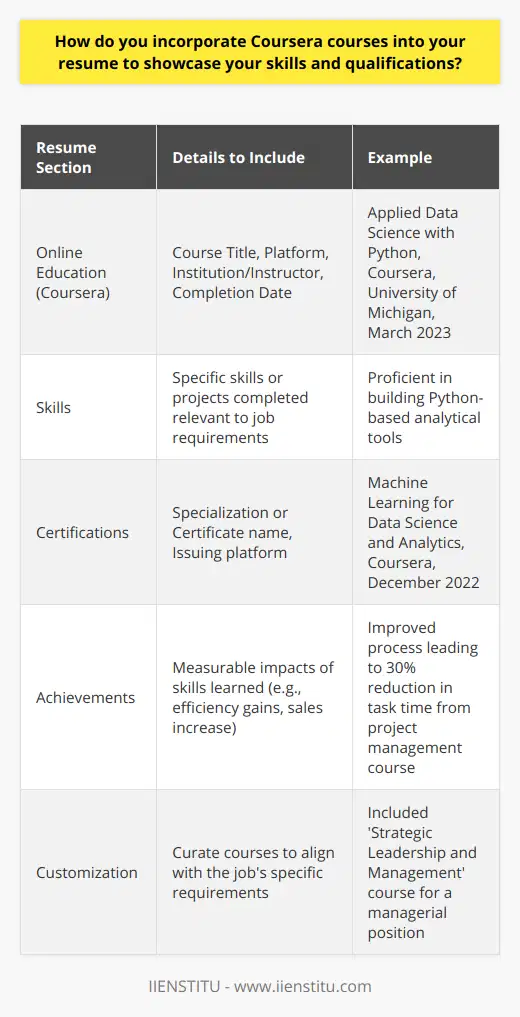
What is the proper method for listing Udemy courses on a resume in order to effectively convey the professional development gained?
**Reflection of Professional Development**
To effectively convey the professional development gained from Udemy courses on a resume, it is essential to list them in a strategic manner. The proper method for listing Udemy courses involves selecting courses relevant to the job position, emphasizing skills learned, and considering the proper placement in the resume.
**Relevant Courses Selection**
Choosing the appropriate courses to include on the resume is the first critical step. Carefully select courses that directly relate to the job, as this demonstrates to potential employers that the candidate has sought out specific knowledge and skills to enhance their professional development. Avoid including irrelevant courses, which might dilute the impact of the resume.
**Emphasizing Skills Learned**
After selecting the relevant courses, emphasize the skills obtained during the course's duration. This is best achieved by briefly describing the key concepts learned and their practical applications. Creating a concise yet impactful list of acquired skills demonstrates competency to potential employers and highlights the value the candidate could bring to the position.
**Proper Placement on Resume**
The final consideration when listing Udemy courses on a resume is placement. Ordinarily, listing them in a separate section titled 'Professional Development' or 'Continuing Education' is the most appropriate choice. This section should be placed below the 'Education' and 'Work Experience' sections, ensuring that they complement, rather than overshadow, the candidate's traditional qualifications and experience.
In conclusion, proper method for listing Udemy courses on a resume consists of selecting courses relevant to the job position, emphasizing the skills learned, and incorporating them into the appropriate section of the resume. This strategic approach effectively conveys the professional development gained from Udemy courses and can significantly enhance a candidate's appeal to potential employers.
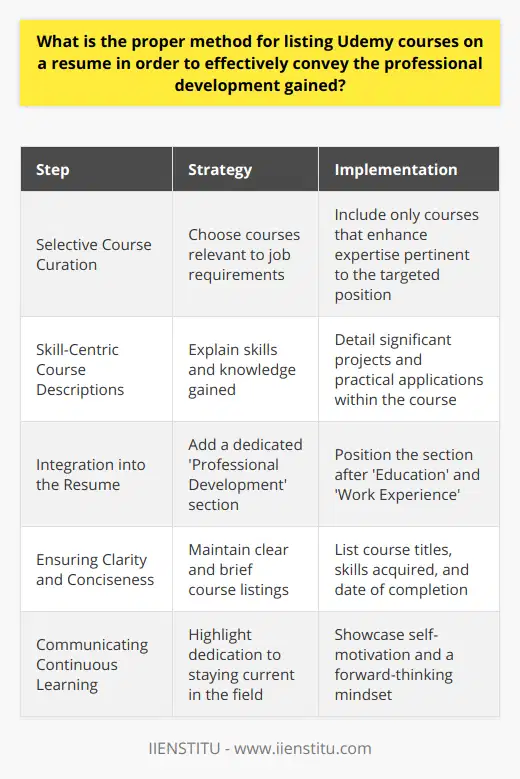
How do you effectively include webinars on a resume to demonstrate specialized knowledge in a given field?
Highlighting Webinar Participation
To effectively include webinars on a resume, it's crucial to first clearly identify the specialized knowledge gained from attending these sessions. Begin by creating a dedicated section on your resume for professional development, where you can list webinars, workshops, and training courses. This section can be titled 'Professional Development,' 'Continuing Education,' or something similar.
Selecting Relevant Webinars
When listing webinars, focus on those that are relevant to the job you're applying for and highlight the specific skills and knowledge gained from each session. Include the title, date, and organizers of the event in your resume. If available, mention any certification or credentials attained through your participation in the webinar.
Demonstrating Practical Application
For each listed webinar, briefly describe how you have applied the gained knowledge in your professional work. This will showcase your ability to transfer learned concepts into practical solutions. You may choose to mention instances in which you've utilized the skills learned from webinars in relevant projects, tasks, or assignments. Make sure to emphasize the positive outcomes that resulted from these practical applications, like improved efficiency or problem resolution.
Quantifying Expertise
If possible, try to quantify the expertise gained from the webinar. For instance, if the webinar trained you on a specific software or tool, mention your proficiency level or provide examples of how you've leveraged the tool in your work. If the webinar awarded you with a certification, be sure to include the name of the certificate and the certifying organization.
Tailoring Your Resume
Finally, always tailor your resume for each application by prioritizing the most relevant webinars for the job. This demonstrates a direct connection between the job requirements and the specialized knowledge gained from attending webinars. It also makes it easier for potential employers to recognize the value you bring to the table through your continued learning initiatives.
In conclusion, incorporating webinars into your resume can be an effective method to demonstrate specialized knowledge in a given field. By clearly highlighting your participation, selecting relevant webinars, showcasing practical applications, and tailoring your resume for each job application, you can make your resume stand out and increase your chances of securing a career opportunity in your chosen field.
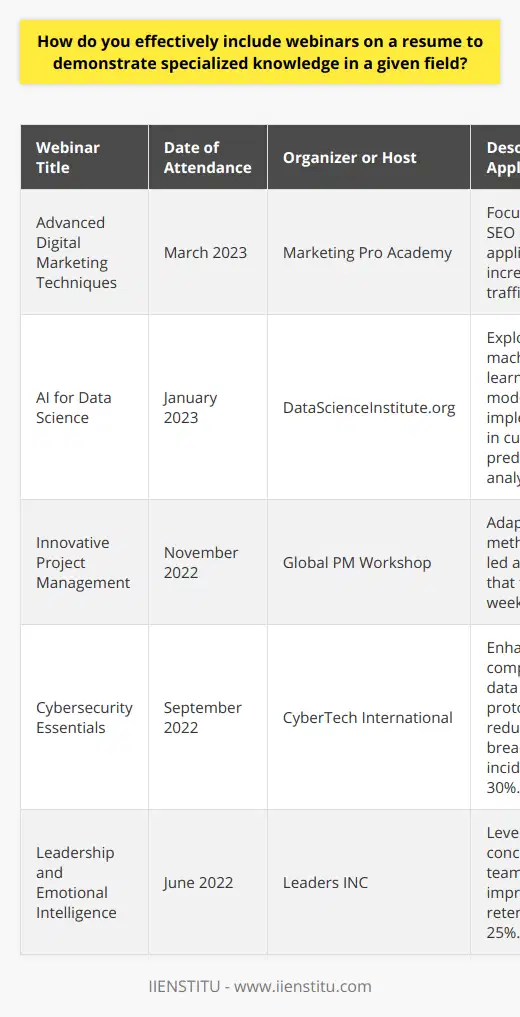
What is the most effective strategy for incorporating online courses into a resume in a way that highlights their relevance to the desired position?
Highlighting Relevance and Transferable Skills
The most effective strategy for incorporating online courses into a resume involves emphasizing their relevance to the desired position and showcasing the transferable skills acquired. By identifying the competencies and knowledge gained from online courses that align with the job requirements, job seekers can effectively demonstrate to potential employers how these courses have enhanced their skill set and prepared them for the position.
Listing Online Courses Strategically
One approach to highlighting online courses is to create a separate section on the resume titled 'Professional Development' or 'Continuing Education.' Within this section, list the courses completed, the institution or platform offering the course, and the date of completion. Including a brief description of the course's primary focus and key takeaways can further showcase its applicability to the target job.
Tailoring Course Descriptions to Job Requirements
When describing the online courses, it's crucial to tailor the language used to match the specific needs and requirements of the position being applied for. This can be achieved by referencing the skills mentioned in the job posting and drawing a clear connection between these skills and the learning outcomes of the relevant online courses. This demonstrates an understanding of the employer's needs and how the candidate's education supports their ability to fulfill those needs.
Showcasing Accomplishments and Practical Applications
Another strategy to effectively incorporate online courses into a resume is to showcase any accomplishments or practical applications that resulted from the completion of these courses. If the online course involved a capstone project or an opportunity to apply learned skills in a real-world setting, it's essential to highlight this experience in the resume. By sharing tangible outcomes and achievements, job seekers can further demonstrate how their online courses have translated into valuable and relevant skills for their desired position.
In conclusion, to maximize the effectiveness of incorporating online courses into a resume, job seekers should focus on highlighting their relevance to the desired position, strategically list the courses, tailor course descriptions to match job requirements, and showcase accomplishments and practical applications gained from these courses. This approach will ensure that employers recognize the value and relevance of the candidate's online education and its potential to contribute to their organization.
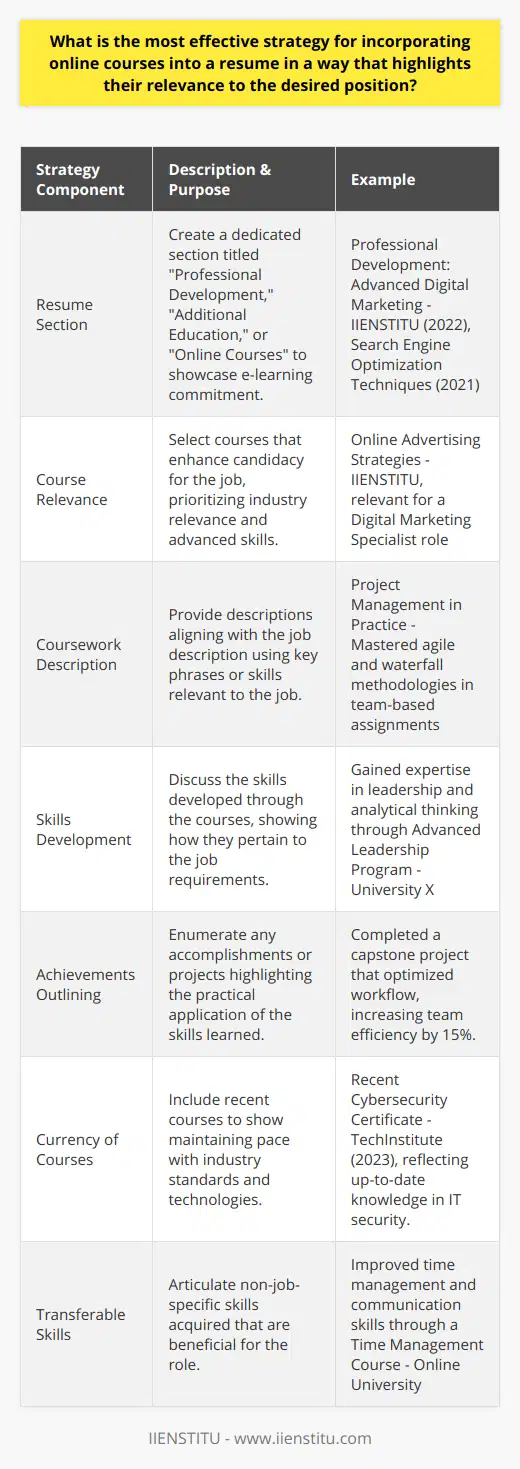
How do you ensure that online education and training are accurately represented on a resume to showcase your professional growth?
Incorporating Online Education on a Resume
One must strategize the inclusion of online courses and training on their resume to reflect their professional growth accurately. This blog post offers guidance for emphasizing online education on one's resume to showcase skill development and knowledge expansion relevant to their career path.
Selecting Relevant Courses
Firstly, it is crucial to consider the relevance of the online course or training before including it on the resume. The selected courses should align with the desired job role and industry. Including irrelevant courses may divert the recruiter's attention away from essential qualifications or experience.
Tailoring the Presentation
Secondly, based on the significance of the online course, strategically tailor its presentation on the resume. If the course holds high relevance, it can be listed under the 'Education' section, denoting the platform or institution where it was attended, the course title, and completion year. However, if the course complements existing skills, it could be mentioned within the 'Skills' section.
Providing Course Details
Furthermore, it is helpful to provide brief details about the online course, showcasing the extent and quality of the learning experience. By offering a concise overview, the recruiter can gauge the relevance and value of the course. For instance, candidates may highlight specific skills or techniques they learned, or the course's project-based nature.
Highlighting Accomplishments
To demonstrate the impact of online education on professional growth, highlight any accomplishments achieved during or as a result of course completion. Listing outcomes such as certifications, awards, or completed projects convey the value of the learning experience.
Emphasizing Soft Skills
Lastly, mentioning the development of soft skills throughout the online education experience strengthens the resume. Skills such as time management, adaptability, and self-motivation are valuable and can be emphasized in the context of learning without direct supervision.
In conclusion, accurately representing online education and training on a resume is fundamental to showcasing one's professional growth. By strategically selecting relevant courses, properly presenting them, providing course details, highlighting accomplishments, and emphasizing developed soft skills, candidates can demonstrate their online learning experience's value effectively.
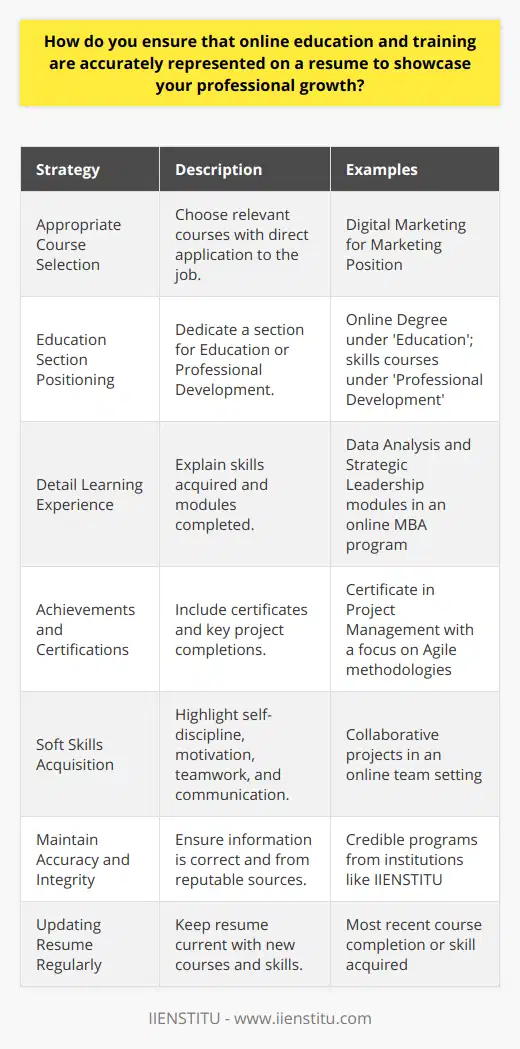
How can online skill-based courses be best included in your resume so that they contribute to demonstrating your competencies and achievements?
Skill-Based Courses in Resumes
Highlight Relevant Courses
To effectively showcase online skill-based courses in your resume, it is crucial to select those that are particularly relevant to the job for which you are applying. This demonstrates a clear understanding of the position and its requirements. When including the courses, ensure they are listed within the appropriate sections on your resume, such as education, professional development, or certifications.
Tailor the Course Descriptions
When listing the skill-based courses, it is essential to tailor the descriptions to align with the competencies and skills desired by the employer. Using keywords from the job description and discussing how the course has contributed to your expertise can help showcase the value of the acquired knowledge in the context of the job.
Quantify Achievements and Outcomes
To make a stronger impact, quantify the outcomes and achievements gained from completing the online courses. This can include the successful implementation of a new technique or improvement in your job performance. Employers appreciate concrete evidence of your growth and the practical applications of the skills you have learned.
Provide Evidence of Learning
To further validate your skill-based courses, consider providing evidence of your learning. This can take the form of digital credentials or badges, certificates of completion, or links to online portfolios showcasing your work. This not only demonstrates your competencies but also your commitment to professional development and continued learning.
Group Non-Relevant Courses
In some cases, you may have completed online courses that do not directly relate to the job but still contribute to your overall skill set. When including these courses, rather than listing them individually, group them under a separate subheading such as 'Additional Skills and Knowledge'. This demonstrates a broader range of expertise and curiosity for learning without detracting from your core qualifications.
In conclusion, carefully selecting and presenting online skill-based courses in your resume is an impactful way to demonstrate your competencies and achievements. Tailoring the courses to the job description, quantifying your achievements, providing evidence of learning, and grouping non-relevant courses combine to create a resume that reflects your dedication to professional growth and development.
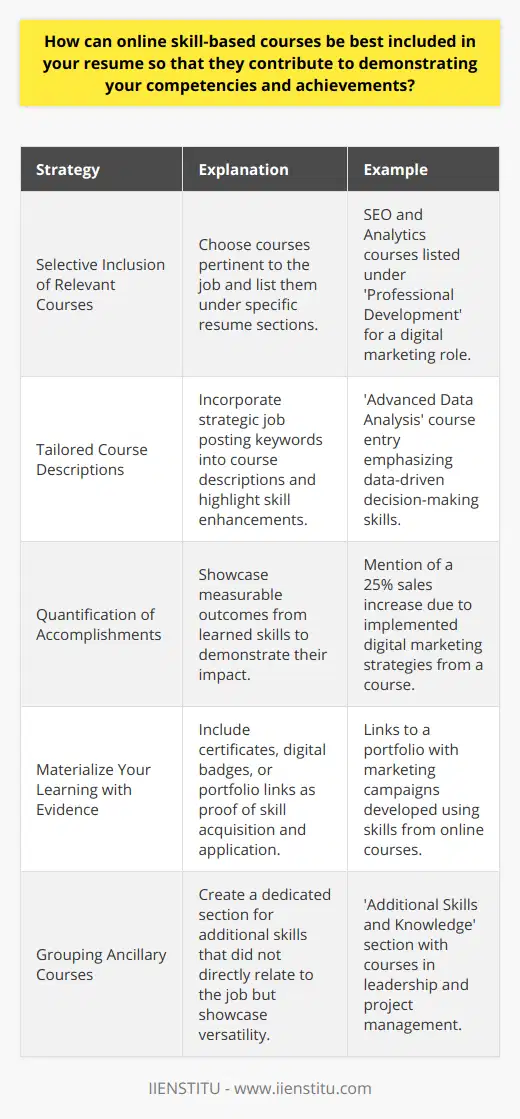
What is the most effective way to represent skills gained from online platforms such as Coursera or Udemy on a resume to highlight their applicability in the job market?
Incorporating Online Courses to Enhance Resume
To effectively represent skills gained from online platforms such as Coursera or Udemy on a resume, it is crucial to thoughtfully incorporate them into relevant sections. This approach not only showcases the applicability of these skills in the job market but also highlights candidates' commitment to continuous learning and professional development.
Listing Courses in a Distinct Section
Creating a separate section on the resume specifically for online courses can provide a clear overview of the individual's skillset. This section should include the course name, provider, and completion date. Optionally, include any certifications or other recognized achievements obtained upon course completion.
Tailoring Course Information to Job Requirements
To cater to role-specific needs, it is important to align online courses with the desired job's requirements. Linking each course to a specific job function, list any specializations, projects, or capstone achievements related to the targeted role. Tailor the descriptions in a manner that demonstrates a strong understanding of the relevant skills.
Quantifying Achievements and Impact
Where applicable, presenting quantifiable outcomes and impacts from one's learnings can further enhance the applicability of the online course. This may include improved performance metrics, successful project completions, or problem-solving outcomes resulting from the applied skills.
Inclusion in Professional Development Section
Alternatively, including online courses in a broader professional development section showcases the candidate's commitment to continuous learning. Along with the online course details, list any workshops, conferences, or industry certifications that demonstrate a well-rounded professional growth strategy.
Using Keywords and Skills
Integrating keywords and relevant skill vocabulary from online courses throughout the resume can provide a comprehensive representation of the candidate's abilities. Utilize terminology that echoes the language of the job posting to increase the chances of being recognized during the screening process.
In summary, the most effective way to represent skills gained from online platforms is to thoughtfully incorporate them into the resume. A distinct section, tailored presentations, quantifiable outcomes, professional development contexts, and relevant keywords all contribute to highlighting the value these skills can bring to a prospective employer.
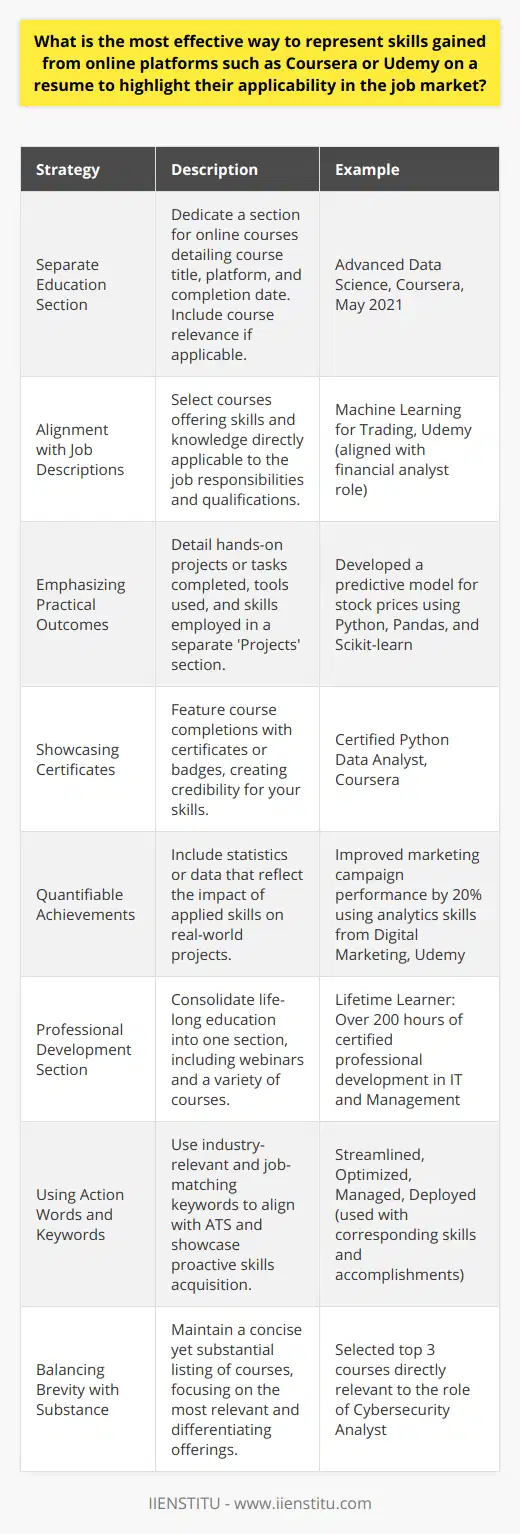
How do you strategically incorporate training classes from various online sources into a resume in order to demonstrate an ongoing commitment to professional development?
Strategic Selection of Online Training Classes
To strategically incorporate training classes from various online sources into a resume, one must first carefully select courses that align with one's professional goals and industry trends. Additionally, choosing high-quality courses from reputable sources such as prestigious universities or accredited platforms can enhance the weight and relevance of the included courses.
Curating a Dedicated Professional Development Section
Creating a dedicated section in the resume for professional development highlights the individual's commitment to continuous learning. This section should be concise, well-organized, and include relevant details of the online training classes, such as the course name, the provider, completion date, and any obtained certifications or licenses.
Utilizing Actionable Verbs and Quantifiable Results
When describing the training classes in a resume, it is crucial to use actionable verbs and quantifiable results. This helps demonstrate the impact of the courses on one's professional growth and makes them more appealing to potential employers. For instance, instead of stating 'completed an online course on project management,' a more effective description would be 'strengthened project management skills by completing an accredited online course, resulting in a 20% increase in project efficiency.'
Emphasizing Relevant Skills and Knowledge Gained
Highlighting the specific skills and knowledge gained from online training classes is essential in demonstrating their value to the prospective employers. Emphasize how these newly acquired skills have been or can be applied to real-life work situations, showing a direct correlation between the online training and improved job performance.
Tailoring the Resume for Specific Job Openings
Lastly, it is crucial to tailor the resume and professional development section to match the requirements of specific job openings. Research the most sought-after skills in the desired industry and prioritize the inclusion of those relevant online training classes when applying for such positions. This not only showcases the candidate's adaptability and resourcefulness but also highlights their commitment to staying updated with the latest industry trends and advancements.
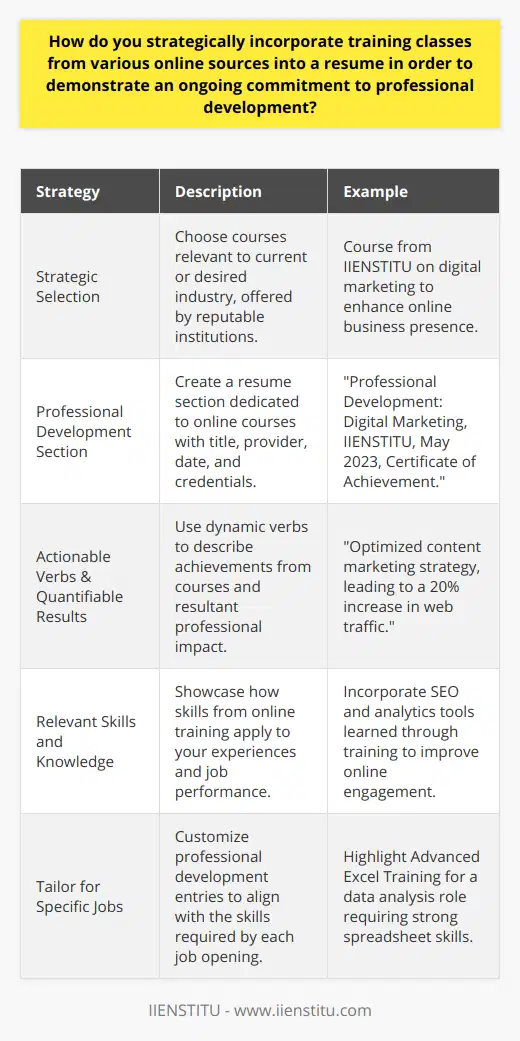
What are the best practices for organizing and presenting online courses in a resume in such a way as to maximize the potential impact on potential employers?
Highlight Relevant Courses
One of the best practices for organizing and presenting online courses in a resume is to focus on showcasing those courses that are the most relevant to the potential job opportunity. This involves carefully analyzing the job requirements and aligning the acquired skills from the online courses to the employer's needs. Present these courses under a separate heading, such as 'Continuing Education,' to emphasize ongoing professional development.
Tailor the Resume
Tailoring the resume for each specific job application is crucial in making an impactful impression on potential employers. Customize the resume by highlighting the most relevant online courses, certifications, and achievements that directly relate to the job requirements. This personalization will demonstrate a genuine interest in the position and the company, increasing the likelihood of being shortlisted for an interview.
Use Actionable Keywords
Leverage professional and industry-specific keywords when addressing the outcomes and skills acquired from the online courses. This not only enhances the quality of the resume but can also increase its visibility in applicant tracking systems (ATS). This practice allows potential employers to easily identify the relevance and applicability of the course to the position in question.
Quantify Achievements
Where possible, quantify the achievements obtained from completing the online courses. This can include the number of projects completed, the percentage of improvement in performance, or any recognition received during the course. Quantified accomplishments provide tangible evidence of the value one can bring to a potential employer and can help a candidate stand out from other applicants.
Include Links to Portfolios or Certificates
Incorporating links to online portfolios, certificates, or course provider profiles adds authenticity to the resume and demonstrates the candidate's commitment to professional development. These links serve as evidence to support the stated accomplishments and can provide additional context for potential employers.
In conclusion, strategically organizing and presenting online courses in a resume is essential to maximize their impact on potential employers. By highlighting relevant courses, tailoring the resume, utilizing actionable keywords, quantifying achievements, and including supporting links, candidates can showcase their professional development and relevance to the job opportunity, positively influencing their chances of success in the job application process.
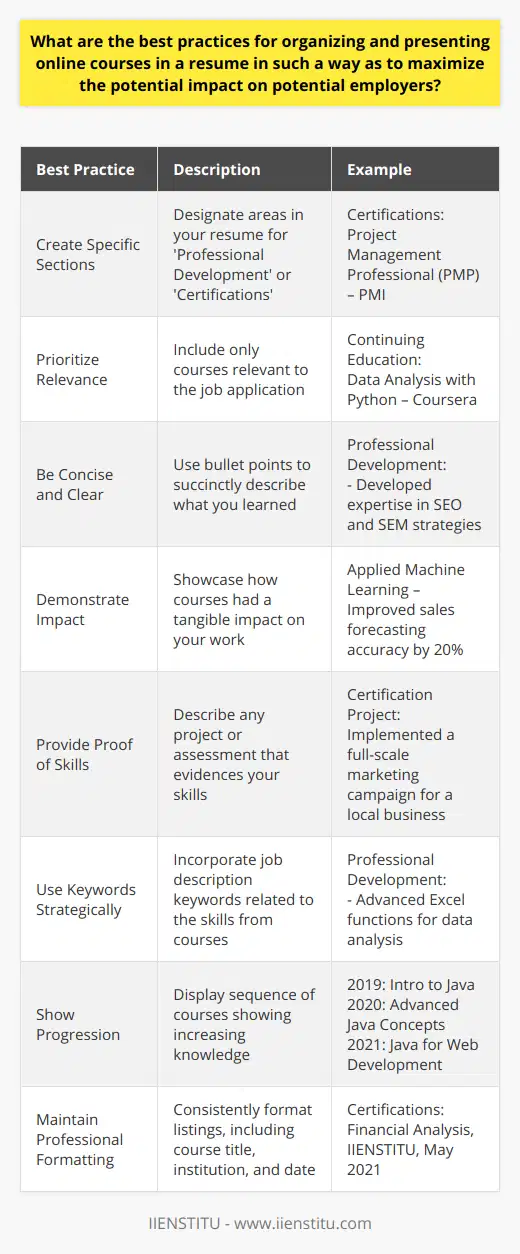
Should I put online courses on my resume, and if so, how can I ensure they are properly presented and relevant to the position I am applying for?
Importance of Online Courses in Resumes
Online courses should definitely be included in your resume as they showcase an individual's drive to learn and broaden their skill set. Due to the prevalence of online education, recruiters are increasingly recognizing the value of online courses and appreciate the effort candidates put into pursuing them. Including relevant online courses on your resume can make your application stand out by demonstrating a higher level of subject matter expertise.
Selecting Relevant Online Courses
To maximize the value of online courses in your resume, focus on those that are pertinent to the position you are applying for. Thoroughly research the job description and identify the key skills or knowledge areas required. Then, select online courses that directly address those specific areas. Ensure that these courses come from well-known educational institutions or recognized platforms to boost the credibility of your qualifications.
Proper Presentation and Organization
In order to effectively showcase your completed online courses, adequate presentation is essential. Create a dedicated section in your resume for professional development or continued education. Within this section, list the titles of the courses, the names of the educational providers, and the dates of completion. Avoid cluttering your resume with excessive course details; instead, focus on providing a succinct yet informative description of the crucial skills gained from each course.
Demonstrating Applicability and Impact
To strengthen the relevance of your online courses, explain how the skills and knowledge you have acquired apply to the position you seek. You can achieve this by incorporating the newly acquired expertise into the description of your professional experience. For example, if you have completed an online course in project management, incorporate specific examples of its application in your previous work experiences. This will convey the practical value and impact of your online education to potential employers.
In conclusion, including online courses in your resume can significantly enhance your candidacy for job positions. By selecting relevant courses, organizing them strategically, and demonstrating their applicability to the role at hand, you can elevate your professional profile and increase your chances of securing the desired job.
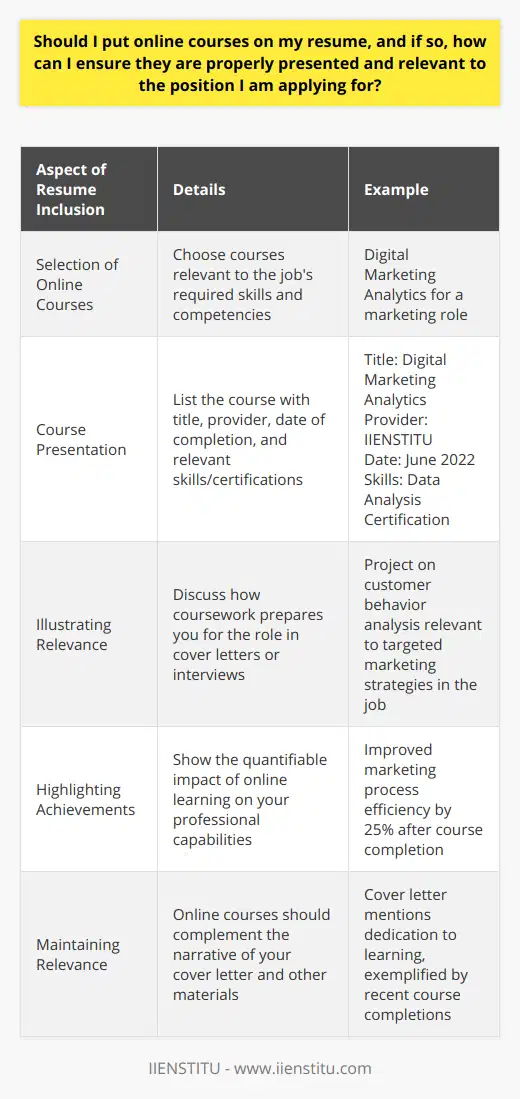
What online courses are considered particularly valuable and impressive to potential employers, and how can they be effectively highlighted on a resume?
High-Value Online Courses
Certain online courses hold more value and impress potential employers due to their relevance and applicability in today's job market. Examples include programming, data analytics, project management, digital marketing, and artificial intelligence courses. These subject areas are particularly significant, as they are in high demand across various industries.
Programming languages and platforms
Courses that teach programming languages such as Python, Java, and C++ are highly valued by employers, as they help develop critical problem-solving skills. Familiarity with platforms like GitHub can also showcase technical prowess and collaboration abilities.
Big data analytics
Data analytics courses like those on SQL, Tableau, and Excel provide crucial skills for interpreting data, identifying trends, and making data-driven decisions. Employers value these proficiencies as they contribute to smarter business strategies.
Project management methodologies
Online courses on project management methodologies, such as Agile, Scrum, and Lean Six Sigma, indicate an individual's ability to lead and manage projects effectively. Certification in these frameworks is especially desirable for employers seeking project managers or team leaders.
Digital marketing strategies
Digital marketing courses that cover search engine optimization (SEO), social media marketing, and content creation can boost a candidate's employability in the marketing sector. These skill sets are essential for reaching and engaging target audiences in a digital age.
Artificial intelligence and machine learning
AI and machine learning courses, like those on TensorFlow and neural networks, showcase a candidate's aptitude for cutting-edge technology. Employers in various sectors recognize the advantage of hiring professionals with these sought-after competencies.
Highlighting Courses on a Resume
Effective showcasing of online courses on a resume involves positioning them strategically to catch an employer's attention. One can:
Create a dedicated 'Online Courses' or 'Professional Development' section to outline relevant online courses. This serves to clearly highlight the acquired skills and qualifications.
Tailor the courses listed to match the job posting's requirements, emphasizing the most relevant ones for the applied position.
Quantify the impact of skills learned, for example, by mentioning the percentage increase in web traffic generated using SEO techniques or data-driven improvements in project efficiency.
In conclusion, pursuing online courses in areas such as programming, data analytics, project management, digital marketing, and artificial intelligence can be particularly impressive to potential employers. By strategically highlighting these courses on a resume, job seekers can showcase their skill sets and stand out in a competitive job market.
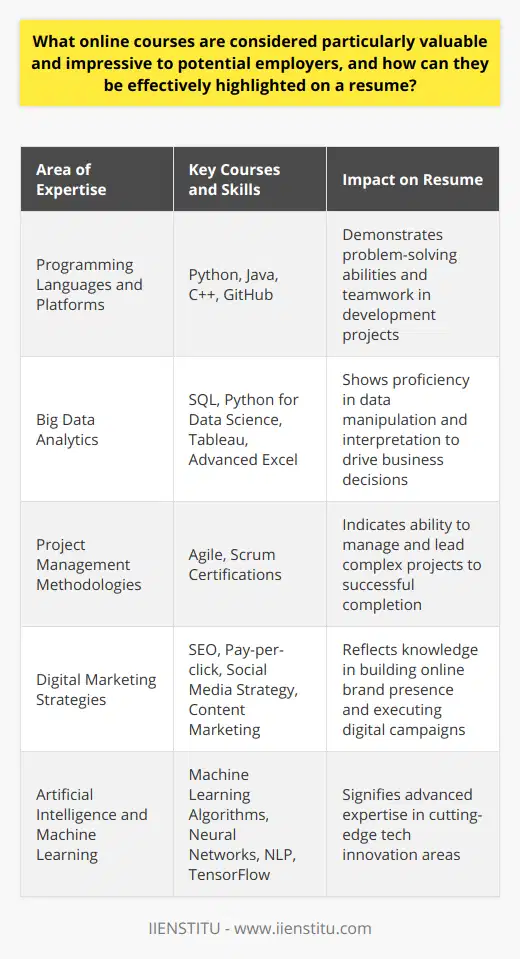
When listing educational accomplishments on a resume, should I include every course I've taken or prioritize those that are most pertinent to the role I am seeking?
Prioritizing Relevant Courses on a Resume
To optimize one's resume for a specific job, it is essential to highlight educational accomplishments that demonstrate skills and knowledge most pertinent to the role being sought. By prioritizing relevant courses, candidates can illustrate their expertise in a particular field, therefore, increasing the likelihood of being considered for a position. However, it is not necessary to list every course taken, as this may result in an overwhelmed or uninviting resume for the reader.
Aligning Education and Job Requirements
By closely examining the job description and requirements, a candidate can selectively choose to showcase the educational accomplishments that align with the desired skills, as well as the duties and expectations of the role they are pursuing. By doing this, they demonstrate their focus on the specific industry and exhibit a deeper understanding of the position requirements. Tailoring one's resume to fit the job is essential for making a favorable impression on hiring managers.
Balancing Quantity and Quality
While listing numerous accomplishments might give the illusion of a well-rounded education, there is a risk of the resume appearing cluttered or unfocused. It is important to achieve a balance between showcasing quality educational accomplishments and providing a comprehensive representation of one's educational background. In most cases, it is advisable to list only relevant coursework, while also providing a general overview of one's degree or educational qualifications.
Selective Inclusion of Supplementary Courses
In some circumstances, it may be beneficial to include additional courses that are not directly pertinent to the role, as they may display transferable skills, such as communication, project management, or collaboration. These supplementary courses should be included selectively and with careful consideration, ensuring they add value to the resume and support the candidate's professional objectives.
In conclusion, when listing educational accomplishments on a resume, it is essential to prioritize courses that are most relevant to the role being sought. Aligning one's education with job requirements, while displaying a balance of quality and quantity, can make a strong impression on potential employers. Selective inclusion of supplementary courses can also offer insights into a candidate's transferable skills, bolstering their desirability for the position.
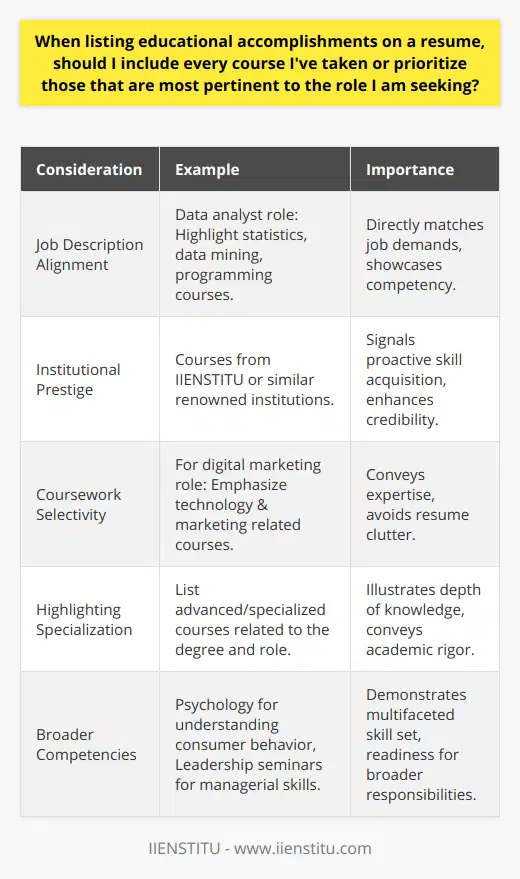
What online courses look good on a resume, and how can they be strategically selected and presented to align with a specific job description or industry expectations?
Strategic Selection of Online Courses
A strategic selection of online courses can significantly enhance a job applicant's profile. Primarily, courses from reputable platforms like Coursera, EdX, and LinkedIn Learning carry weight on resumes. Specifically, courses related to data analysis, project management, digital marketing, coding, and machine learning are particularly attractive to employers.
Alignment with Job Description
Aligning online courses with specific job descriptions is critical. Understanding the job requirements and choosing corresponding skills can give a competitive edge. For example, an applicant for a digital marketing role could take courses in SEO, content marketing, and Google Analytics to align closely with job expectations.
Industry Expectations
Understanding an industry's expectations is another vital factor. For example, in tech industries, programming and coding courses are valuable. In contrast, the service industry may value courses in customer service or communication. Comprehensive research on the industry's needs can guide the selection of online courses.
Presentation on Resume
How these courses are presented on the resume also influences their impact. Grouping them under a separate section titled 'Professional Development' or 'Continual Learning' can make them stand out. Furthermore, a brief description of what was learned and any notable achievements during the course can add more weight to its value. The use of relevant keywords helps align the courses with the job description and industry expectations.
In conclusion, the strategic selection and presentation of online courses on a resume can help differentiate an applicant. High-quality courses aligned with specific job descriptions and industry expectations can make a significant difference.
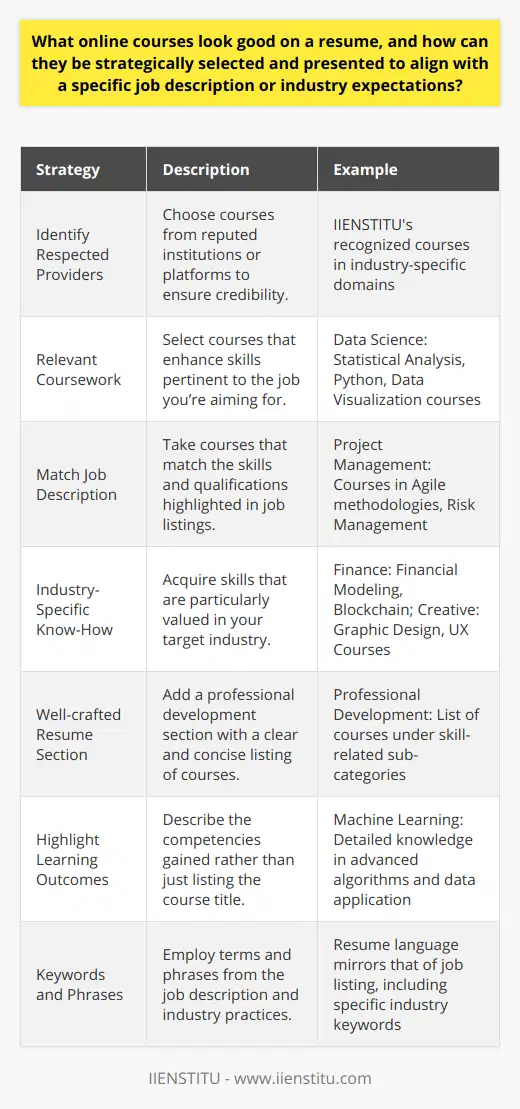
How do you put learning courses on a resume in a way that emphasizes their practical applicability, demonstrates skill improvement, and highlights the relevance to the position being applied for?
Understanding Resume Composition
Building an impressive and effective resume takes finesse. This includes the strategic integration of learning courses to demonstrate competence and increase your value proposition.
Aligning Courses with Job Requirements
Your primary job while preparing your resume is to portray your qualifications efficiently. This starts by outlining learning courses that correspond directly with the job requirements. You should replicate language from the job advertisement where appropriate and link these with corresponding courses you've taken.
Showcasing Skill Improvement
Emphasis on skills acquired during your learning courses highlights your continued growth. Think about the practical skills gained and how these can be applied in the position you desire. Concrete examples of the skills developed during these courses demonstrate their practical applicability.
Contextualizing Coursework
Remember to provide a context to aid clarity about the specific skills learnt. This includes mentioning projects or assignments that you worked on during the course. Contextualizing your skills not only shows what you learnt but also how you applied it.
Connecting to Position Relevance
A crucial part to note is demonstrating how these learning courses align with the position you're applying for. Make the connection clear by intimating how the course compliments the role in question.
Highlighting Continued Learning
Above all, ensuring potential employers recognize that you're continuously learning is key. It shows commitment to professional growth and drive for self-improvement which are generally sought-after qualities. Mentioning learning courses on your resume underlines this attribute.
In conclusion, it's imperative to understand that listing learning courses on the resume is not just about filling space. It’s an opportunity to demonstrate your capacity to learn, show improvement and increase your value as a potential employee. Tailoring this list to each position you're applying for can make your candidacy more appealing to potential employers.
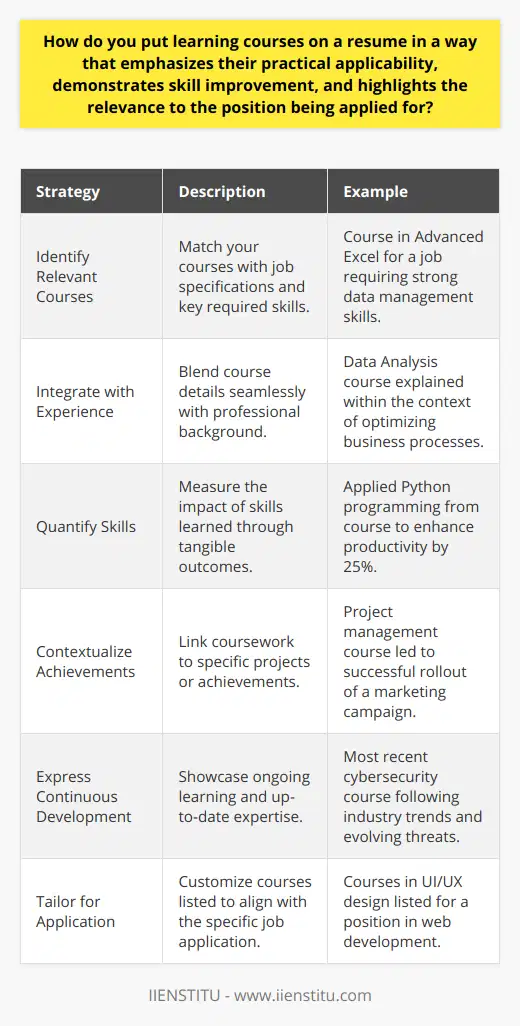
Should I list all my courses on a resume, or is it more beneficial to prioritize and curate a selection of courses that showcase my most relevant skills and competencies tailored to the desired job?
Curating Course Listings for Relevance
When crafting a resume, the temptation often exists to include a comprehensive list of all academic courses undertaken. However, experts advise a more strategic approach. Rather than inundating the potential employer with an exhaustive list, prioritize courses that specifically showcase relevant skills and potential competencies for the desired job.
Consider Relevance and Impact
In the pursuit of brevity and impact, the focus should be on listing only those courses that align with the job requirements. The process involves identifying key attributes or skills specified in the job description. Subsequently, list courses that either directly helped develop these skills or enabled experiences that did so indirectly.
Crafting Skill-Oriented Details
Here, the aim is not just about naming the relevant courses. Aspiring candidates should also articulate how such courses can address the needs of the potential employer. The goal is to vividly detail the value proposition each course brings to the table. For instance, a course in Project Management does not only signify knowledge in the area but may also imply skills in leadership, coordination, and problem-solving.
Explicit and Implicit Skills
Additionally, remember that explicitly taught skills are as important as those implicitly acquired. This means a Statistics course does not only mean statistical abilities, but also critical thinking and data interpretation skills. Remember, the goal here is effective communication of one's competence, and potential value, to a prospective employer.
To summarize, curating your courses to align with the requirements of the prospective job is the recommended practice. This approach enables the applicant to communicate their relevance effectively while avoiding unnecessary information. Each course, directly or indirectly, paints a picture of a candidate's potential value to an employer and should be treated as such in a resume. Proactive alignment of courses with job requirements presents potential employers with a clear, valuable, and tailored skills snapshot, effectively boosting your chances of consideration.
